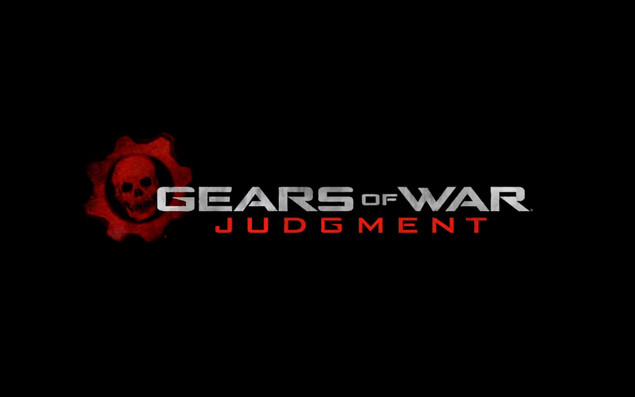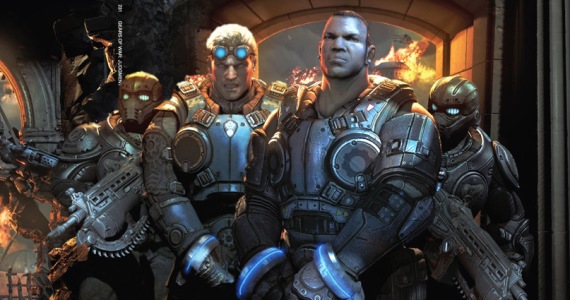Last updated on March 4, 2013
E3 belated coverage! Somehow, I forgot to cover this! I apologize for linking to 1UP so often, but as far as mainstream websites go, their coverage is never half bad, and certainly doesn’t strike one as a bunch of people that some game company hobbled into an office and forced them to write a review of their game with a large number on it.
Phew.
Now that I’ve said that, the new Gears of War looks as if it’s shaping up to be…interesting, to say the least. An actual story? An already dated narrative style augmenting game mechanics? Sign me up! And People Can Fly, creators of Bulletstorm, at the head of it? This should be quite a game, but I have my reservations.
As a fan of stupid action movies and the like, I have to give credit where credit is due: Gears of War reminds me of the best 80s action films. The content, basically, was creative violence. How many different ways can I show hero X demolishing something else (be it person or thing), and what kind of obstacles can we place in the hero’s path? There’s plenty of action movies, but only a few that get this right. Take Predator, for example – it works because the film establishes that everyone on the team led by Arnold and Friends is a total group of absolute psychos who are highly skilled at their mercenary profession (the more common way to describe this, at least in popular culture, is “badass”). They’re also comrades in arms, and their witty dialogue (who doesn’t remember “I ain’t got time to bleed”?) makes us sure that they’ve been working together for a long time. No threat has been too great for them. Thus, when the Predator comes on the scene, you know that he/she/it transcends their skill to a great degree, and only a combination of ingenuity and skill will save whoever survives. Ramping up the stakes throughout the film creates tension, excitement, and action. Who will die and who will live? It’s not as obvious as you’d think on first viewing, and that’s why it works.
For Gears of War, the setup might strike the reader as entirely different, but it establishes early the strength of the Gears themselves and their comraderies through both the in-game mechanics and the dialogue. You have to stay together to survive, and you have to take cover unless you want to die. Dom needs to FIND HIS WIFE, the Cole Train can only run unless you defend him, and Baird isn’t going to simply stop being a total pessimist. They’re likable, funny, and always provide something to the player as he mows down alien after alien. As I’ve noted previously, Gears of War doesn’t do anything essentially new; it just adopts already established mechanics and applies them to a three dimensional plane. That EpicGames basically layers broseph college frat culture on top of it, adopting almost every single action movie trope you could imagine, just adds to the experience.
In other words, Gears of War reveals its complexity through its total simplicity in taking the absolute surface level of everything and running with it, creating something hilariously dumb and intensely awesome to experience all at the same time. It certainly isn’t a ladies game, that’s for sure (what a sexist you are!).
So when you think of Gears of War plus a story, a serious story if I gather correctly, that’s a very difficult thing for me to accept. Obviously, I don’t think the Gears series has a handle on the “innovation” side other than refining the best concepts of other action games, but I don’t know if I want a serious narrative. I’m going to guess (and this is just speculation) that the game will work much like the previous three games in the series and that this “story” emphasis just represents a selling point more than anything. The increased difficulty tied with story elements, though, just reeks of genius. I’ll probably play the highest difficulty right off the bat just to get the “real” story out of the situation. The improved enemy AI is icing on the cake. I’ve been waiting for a game that can integrate its story and mechanics and, additionally, not sacrifice difficulty for the narrative. I’m hoping this will be it.
Perhaps I’ve just been too influenced by Scripture study to make any objective statement to that effect. For anyone who’s looked at the Bible, a library of 66 books without any common genre distinctions or linear narrative (the order the books even has in the current Protestant, Catholic, or Orthodox canons don’t tell the “story” in linear order, believe me), the idea that there’s someone a metanarrative of humankind’s salvation doesn’t appear obvious in any way, shape, or form. Although I could give you an easy answer and say “the Holy Spirit makes it a complete narrative when a believer reads it”, how about everyone else?
But, and here’s a weird thing to say, it’s part of the fun (hah) to figure out what it all means. That’s why I “do” theology, after all – if they’re weren’t some mysteries to probe, some elements that remained unclear, or some things I would like to know, I’d rather search, study and discover even if the answers aren’t forthcoming. It’s that constant attempt to understand God better – in both daily life and in the Bible – that motivates the search. So what if it’s difficult to understand? Who said everything in life was easy? Christianity certainly isn’t! Take Paul in 2 Corinthians talking about the “thorn” in his side:
Boasting is necessary, though it is not profitable; but I will go on to visions and revelations of the Lord. 2 I know a man in Christ who fourteen years ago—whether in the body I do not know, or out of the body I do not know,God knows—such a man was caught up to the third heaven. 3 And I know how such a man—whether in the body or apart from the body I do not know, God knows— 4 was caught up into Paradise and heard inexpressible words, which a man is not permitted to speak. 5 On behalf of such a man I will boast; but on my own behalf I will not boast, except in regard to my weaknesses. 6 For if I do wish to boast I will not be foolish, for I will be speaking the truth; but I refrainfrom this, so that no one will credit me with more than he sees in me or hears from me. 7 Because of the surpassing greatness of the revelations, for this reason, to keep me from exalting myself, there was given me a thorn in the flesh, a messenger of Satan to torment me—to keep me from exalting myself! 8 Concerning this I implored the Lord three times that it might leave me. 9 And He has said to me, “My grace is sufficient for you, for power is perfected in weakness.” Most gladly, therefore, I will rather boast about my weaknesses, so that the power of Christ may dwell in me. 10 Therefore I am well content with weaknesses, with insults, with distresses, with persecutions, with difficulties, for Christ’s sake; for when I am weak, then I am strong.
Paul, given a vision of some sort which he apparently can’t tell anyone, is given an intentional debilitation to demonstrate how strength comes out of weakness. We could take the obvious interpretation here, but let’s move a little beyond it. What if great insight and revelations by ourselves, whatever they might be, are limited by our own fears and failings? Paul, here, can’t even reveal the things which he has seen, but God takes him low to teach him about pride and boasting, and to understand strength in weakness. Perhaps this is also true of what we read in Scripture – we get a glimpse of what’s going on in reality, enough to get the mechanics and the depth, but the higher things, probably due to our inability to understand, are restricted from human grasp. That’s where the difficulty comes in piecing together the divine narrative – God gave us the framework, but we have a responsibility to understand it rightly under the guidance of the Holy Spirit. It’s intentionally difficulty, to be played out in the life of the Church and in community with each other. A unified front strikes me as something akin to brainwashing – we’re all going to have differences of opinion, but we can be united in that weakness of disunity. Don’t you love paradox?
That’s why I’m hoping for video games that combine narrative and mechanics: because everything really does work that way, from my perspective. Only a video game can do this because it’s interactive, and forces you to grapple with your role in the story. And the closer we get to that, the closer we understand what we do know and what we don’t, and not to overstep our boundaries when making crass statements (Harold Camping, I’m looking at you) about concepts we couldn’t possibly understand. Yet, they all make sense in light of the greater context. Maybe Gears of War Judgment will do it, and at least give us a tiny bit of mystery even if I play the game on the maximum difficulty. Guess we’ll just wait and see.


